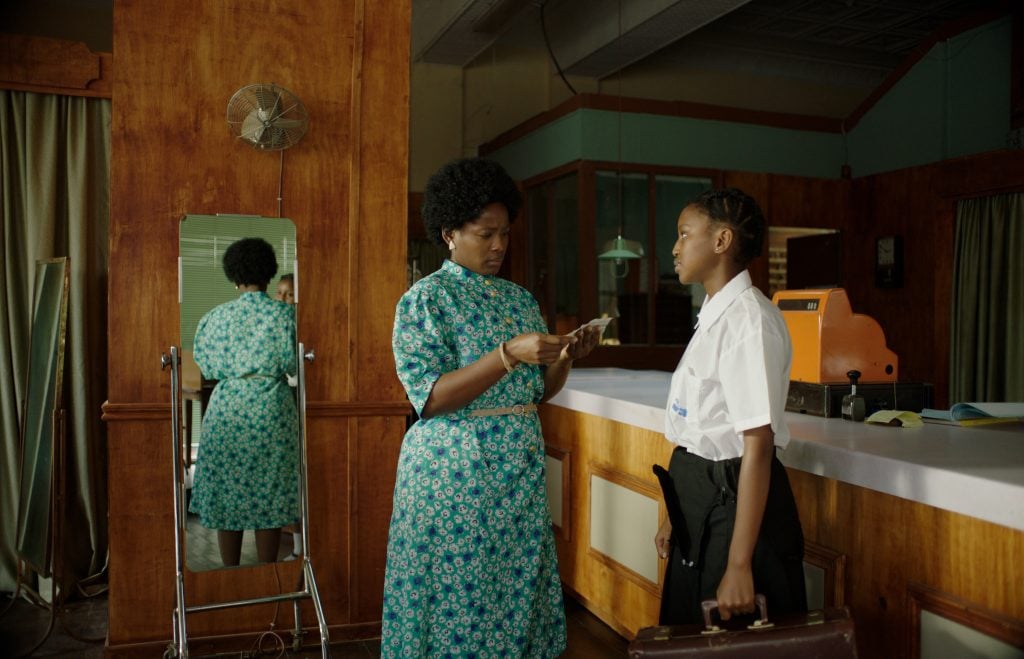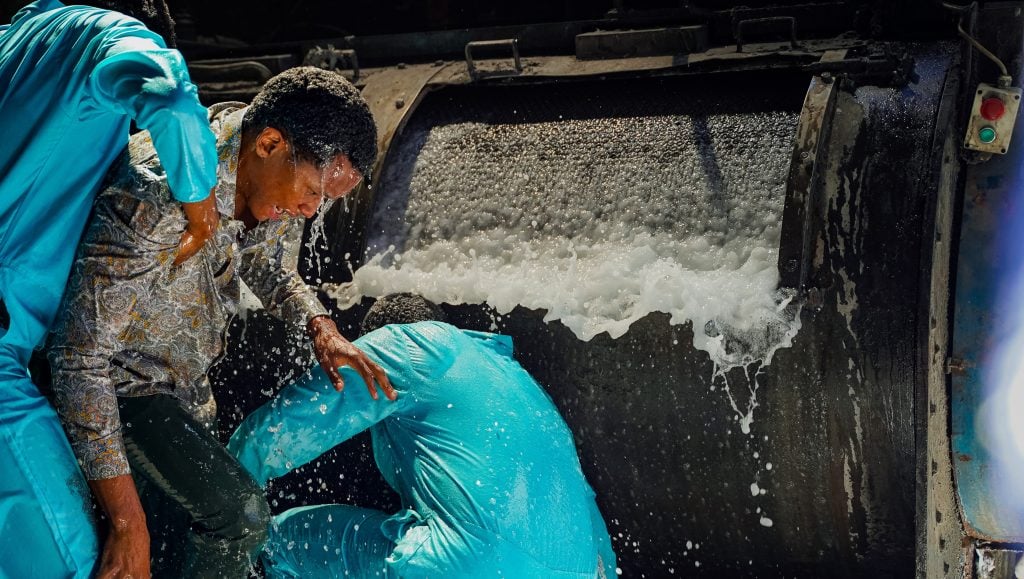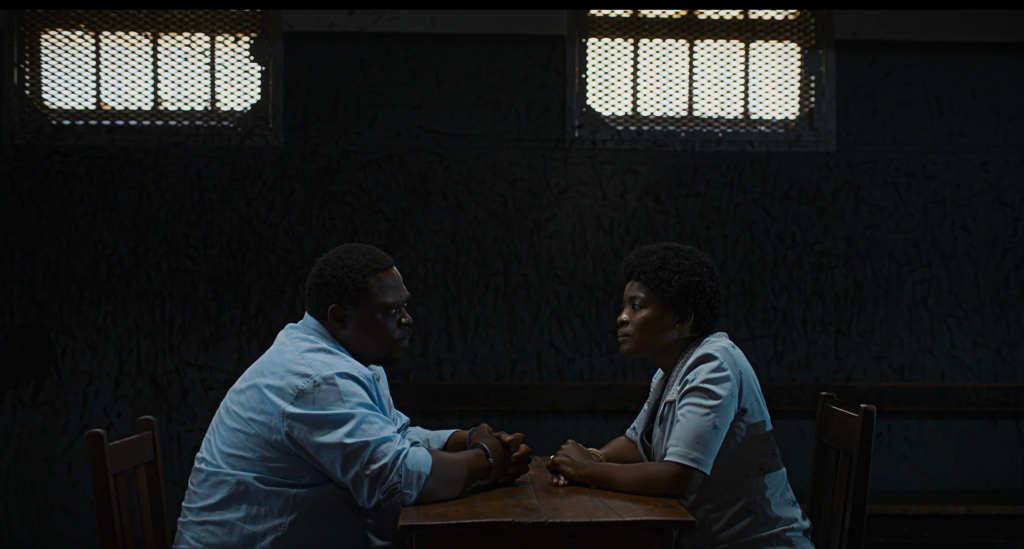It’s easy to downplay the overarching effects of an evil political system the further you get away from it.
In truth, apartheid in South Africa only ended in the last four decades. And yet, there appears to be an active project to diminish its physical, social, economic, and psychological cruelties for the sake of a certain EV billionaire’s grievances. Despite that person’s inability to not make his various skill issues everyone else’s problem, the harm of apartheid is paramount and can’t be waved away with a few vague statements from government officials who absolutely know better.
However, just in case those people and their erstwhile billionaire make some headway, Laundry exists. The Swiss-South African production by Zamo Mkhwanazi, which premiered at the 2025 Toronto International Film Festival, is ostensibly about a modest but ambitious laundromat-owning family in 1960s South Africa. The patriarch, Enoch Sithole (Siyabonga Shibe), has carved out a niche for himself and his loved ones by way of a mutually beneficial partnership with a white government official. While he intends that partnership to secure the financial and social success of his family for generations, his son Khuthala (Ntobeko Sishi) has other plans. He wants to be a musician and is willing to do anything to achieve his dreams. That includes seeking the help of Lillian (Tracy September), a local singer who’s also his father’s not-so-secret mistress. Khuthala is willing to make that uncomfortable moral sacrifice if it means traveling the world and making music.

Laundry is driven by sacrifices, but not especially within the confines of Khuthala’s fledgling music career. Rather, the sacrifices frequently land within the context of the apartheid government. Mkhwanazi constructs a thoughtful, full-scope examination of the myriad limits that apartheid placed on Black South Africans, and the subsequent costs and compromises of those limits. We see it in big and small ways: in white government workers ignoring and dismissing Black citizens waiting patiently for paperwork to be approved, in Black prisoners being told to only speak in Afrikaans or English rather than their mother tongues, and in how British missionaries regard Black South Africans as mentally stunted and in need of governmental and religious intervention.
It comes across most powerfully in Enoch’s confrontation with the colleagues of the government official he works with, who grants him a special medallion indicating his status. Despite that status, Enoch is keenly aware that he is at the whims of white people who can choose to ignore the medallion altogether. When he meets those government colleagues, who indeed mock the medallion, we see Enoch carefully modulate between confidence and deference, lest he incur their wrath. Mkhwanazi’s tight pacing and tighter closeups of Enoch and his medallion create suffocating tension, acutely conveying his fear, frustration, and muted defiance. She also communicates the inevitability of the encounter’s disaster: despite his most deferential efforts, those officials will succeed over him, whether it be through intimidation, humiliation, or violence. The sheer suggestion of any of those cruel triumphs makes Enoch’s confrontation one of the film’s best and most harrowing scenes.
The reality of apartheid’s viciousness makes for surprisingly fertile ground for Khuthala and Lilian to meet on. Lilian is known in South Africa as a successful singer, but she’s known throughout the world as a vital voice detailing Black South Africans’ struggles. United in frustration and fear over Enoch’s incarceration, the musician and singer partake in a transformative jam session, where music gives sound to their collective righteous indignation. The scene calls to mind Sammie’s juke joint performance in Sinners. The scenes can form two halves of one whole, with Black music as a cathartic conduit for joy in Sinners and sorrow and anger in Laundry. It’s such a powerful thematic force that its relative absence in the film’s second half is disappointing.

However, you do understand why that force shifts, as Laundry demonstrates that the connections we value most are usually first to be sacrificed. As the film enters its final act, Mkhwanazi brings the concept of apartheid sacrifices full circle. Khuthala is presented with a series of choices in that final stretch that are not truly choices because of the lopsided weight of his options. He has no choice, and it’s devastating to see what he gives up. (Ntobeko Sishi does a lovely job conveying Khuthala’s relentless drive and anguished desperation with equal verve.) Again, it also feels inevitable. Apartheid’s intolerable cruelty spares no one, and it would be dishonest to suggest he could find peace within the confines of a system utterly lacking in it. And yet, the uncompromising truth doesn’t keep you from aching for Khuthala, his family, and all they must endure for scraps.
It would be nice if Laundry didn’t feel so timely. It shouldn’t have to serve as an immediate reminder that racial systems are not dismantled overnight, and even the dismantled ones still yield fresh scars. Sadly, it can’t, as certain subsects of people seemingly inch closer to suggesting that apartheid wasn’t that bad, actually. However, if a film has to bear that unfortunate load, Laundry is an excellent one for the job. Even outside of its current relevance, the film feels like an urgent reflection of a largely stagnant geopolitical environment. Within that relevance, however, Mkhwanazi crafts a powerful denunciation of the resurgence of white supremacy in South Africa by laying out the long-festering evils of apartheid in no uncertain terms.
Laundry held its World Premiere as part of the Discovery section at the 2025 Toronto International Film Festival.
Director: Zamo Mkhwanazi
Screenwriter: Zamo Mkhwanazi
Rated: NR
Runtime: 106m
Mkhwanazi crafts a powerful denunciation of the resurgence of white supremacy in South Africa by laying out the long-festering evils of apartheid in no uncertain terms.
-
GVN Rating 8
-
User Ratings (0 Votes)
0
A late-stage millennial lover of most things related to pop culture. Becomes irrationally irritated by Oscar predictions that don’t come true.






